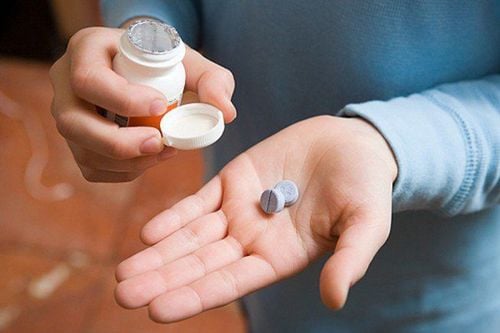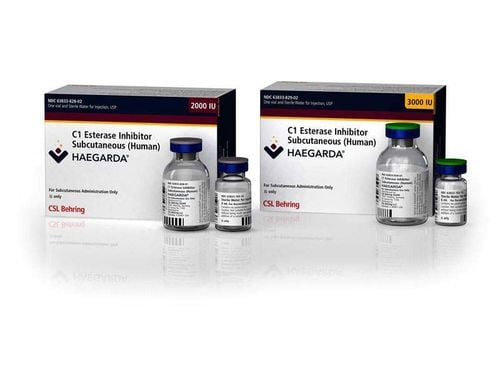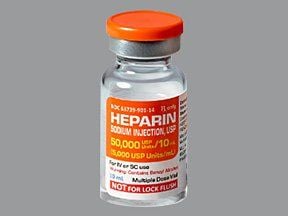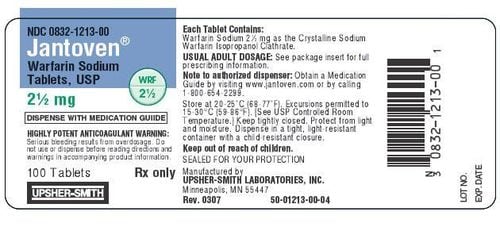This is an automatically translated article.
Eliquis (generic name: Apixaban) is an anticoagulant medicine that works by blocking certain proteins that cause blood to clot. Eliquis 2.5 mg tablets are usually yellow, round, double-sided imprinted with the symbols "893" and "2 1/2".
1. What effect does Eliquis have?
Eliquis is often prescribed to prevent blood clots from forming due to an irregular heartbeat (atrial fibrillation) or after hip/knee replacement surgery. Atrial fibrillation refers to a condition in which part of the heart does not beat in a normal way. This can lead to blood clots, which then travel to other parts of the body (such as the lungs or legs) or increase the risk of a stroke. In the United States, apixaban is also approved to treat certain conditions related to blood clots (such as deep vein thrombosis and pulmonary embolism), and to prevent blood clots from forming again.
2. Eliquis User Manual
Read the Drug Information label and instructions provided by your pharmacist (if applicable) before you start taking Apixaban and each time you get a refill. If you have any questions, ask your doctor or pharmacist for answers.
Take Eliquis as directed by your doctor, usually twice daily (12 hours apart), with or without food. If you cannot swallow the tablet whole, you can crush the tablet and mix it with water or apple juice and drink it right away.
Dosage will be based on:
Health condition Age Age Weight Kidney function Responsiveness to treatment Other medications being taken. Be sure to tell your doctor and pharmacist all medications you are taking (including prescription drugs, over-the-counter medicines, and herbal products). If you are taking Apixaban to prevent blood clots from forming after surgery, the length of treatment will depend on the type of surgery you had.
Do not stop taking Eliquis on your own without consulting your doctor. Some conditions may get worse when this medicine is stopped suddenly. Also, be careful not to use up all the medicine you have and add a new one before the old one runs out.
Regular use of Eliquis will help maximize the benefits. To help you remember better, take your pills at the same times every day

Người bệnh nên sử dụng thuốc Eliquis theo hướng dẫn
3. Side effects when using Eliquis
Sometimes users may experience some side effects, including:
Nausea Easy bruising Light bleeding (such as nosebleeds, bleeding from cuts) If any of the above symptoms persists or gets worse, tell your doctor or pharmacist right away.
It should be noted that when you were prescribed Eliquis, your doctor judged that the benefit of treatment outweighed the risk of side effects. There are still many cases where this drug is safe to use without serious side effects.
Eliquis can cause severe bleeding if it affects blood clotting proteins too much. Tell your doctor right away if you have signs of severe bleeding, including:
Unusual pain/swelling/discomfort Unusual bruising Unusual bleeding gums or cuts Persistent/frequent nosebleeds Frequent heavy/unusually prolonged menstrual periods Pink/dark urine Coughing up blood Blood in vomit or looks like coffee grounds Severe headache Dizziness/ fainting Prolonged fatigue/ weakness Bloody stools/ black/tarry Difficult to swallow. Get medical care right away if you have signs of extremely serious bleeding, including:
Vision changes Confusion Difficulty speaking Weakness on one side of the body.
It is very unlikely that a serious allergic reaction to Eliquis will occur. However, get medical help right away if you notice any of the following serious allergy symptoms:
Rash Itching or swelling, especially in the face/tongue/throat area) Severe dizziness Shortness of breath. Also, if you experience side effects other than those listed above, contact your doctor or pharmacist for help.

Thuốc Eliquis có thể gây ra một số tác dụng phụ
4. Precautions while taking Eliquis
Before taking this medicine, tell your doctor or pharmacist if you are allergic to Apixaban or any other allergic condition. This product may contain inactive ingredients, leading to allergic reactions or other medical problems. You can ask your pharmacist for more details.
Users also need to inform their medical history to their doctor or pharmacist before taking the drug, especially:
Liver disease Kidney disease Hemorrhagic problems (such as stomach/intestinal bleeding, bleeding in the brain) Blood disorders (eg, anemia, hemophilia, thrombocytopenia) Recent trauma or major surgery Stroke Coagulation disorder (antiphospholipid syndrome) Frequent falls/trauma. Before surgery or any dental medical procedure (especially lumbar puncture or spinal/epidural anesthesia), tell your doctor or dentist about all medications you take. use (including prescription, OTC, and herbal medications). The doctor or dentist may ask the patient to stop taking Apixaban before having surgery.
Eliquis can lead to stomach bleeding. Drinking alcohol daily while using this medicine increases your risk of stomach bleeding. Therefore, you should limit the use of alcoholic beverages. Ask your doctor or pharmacist about how much alcohol you can safely drink.
Eliquis may cause bleeding. So to reduce the risk of an open wound, bruise or injury, use extreme caution with sharp objects such as razors and nail clippers. Use a safe electric razor when shaving and a soft toothbrush when brushing your teeth. Limit vigorous activities such as contact sports. If you fall or are injured, especially if you hit your head, contact your doctor immediately to be checked for serious hidden bleeding.
Do not stop taking Apixaban without your doctor's prescription. If you stop taking this medicine early, you have an increased risk of developing serious blood clots (such as stroke, blood clots in the legs/lungs). Your doctor may direct you to take a "blood thinner" or other antiplatelet medication to reduce your risk. Go to a hospital or medical facility right away if you have:
Weakness on one side of the body Difficulty speaking Sudden vision changes Confusion Chest pain Shortness of breath Pain/warmth/swelling in the legs.
People taking Eliquis may also experience bleeding near the spinal cord after certain medical procedures that involve the spine. Bleeding in this area carries the risk of prolonged or even permanent paralysis. Therefore, it is important to discuss the benefits and risks with your doctor carefully before performing spinal interventions. The risk of bleeding may be higher if you:
Have a spinal deformity Have had previous spinal procedures/surgery (eg, epidural catheterization, lumbar puncture) Are taking other medicines that can cause bleeding/bruising (including antiplatelet agents), clopidogrel, "blood thinners" (warfarin/enoxaparin), nonsteroidal anti-inflammatory drugs-NSAIDs (ibuprofen). Tell your doctor right away if you notice symptoms such as:
Back pain Leg numbness/tingling/weakness Inability to control bowels or bladder (fecal incontinence). Pregnant women should only use Eliquis when clearly needed, after carefully weighing the risks and benefits with their doctor. Apixaban may increase the risk of bleeding in the mother, fetus, and newborn baby. Your doctor may change the type of medicine you take during pregnancy.
It is not known whether Eliquis passes into breast milk. But because of the risk to the infant, women being treated with this medicine are not recommended to breastfeed. Consult your doctor or pharmacist for more specific advice.

Người bệnh cần tuân thủ chỉ định dùng thuốc Eliquis của bác sĩ
5. Interactions between Eliquis and other drugs
Drug interactions can change the way Eliquis works or increase your risk of serious side effects. Write a list of all the medications you take (including prescription/OTC drugs and herbs), then share them with your doctor and pharmacist. Do not start, stop, or change the dose of any medicine without your doctor's approval.
Some products that may interact with Eliquis include:
Mifepristone Other drugs that can cause bleeding/bruising, including antiplatelet drugs (clopidogrel) and blood thinners (warfarin, enoxaparin) Some antidepressants, including SSRIs (fluoxetine) and SNRIs (desvenlafaxine/venlafaxine). Other drugs can affect how Apixaban is eliminated from the body and how Apixaban works. Examples include:
Certain azole antifungals, eg posaconazole, itraconazole, ketoconazole Conivaptan HIV protease inhibitors (such as lopinavir, ritonavir) Rifamycins (such as rifabutin) St. John's wort Medicines used to treat seizures (such as carbamazepine phenytoin). Check all prescription and over-the-counter OTC labels carefully as many contain pain relievers/fever reducers (aspirin, NSAIDs such as ibuprofen, naproxen) that increase the risk of bleeding if taken with Eliquis. But if your doctor has directed you to take low-dose aspirin to prevent a heart attack or stroke (usually at doses of 81 - 325 milligrams per day), you should continue to follow the directions. Contact your doctor or pharmacist for more details.
6. Some other notes when using Eliquis
6.1. Overdose Call a poison control center right away if you have overdosed. Call 911 for severe symptoms such as fainting or difficulty breathing. Overdose warning signs usually include:
Bloody/black/tarry stools Pink/dark urine Unusual/prolonged bleeding. 6.2. Missed dose In case you forget to take a dose, take it as soon as you remember. If it is almost time for your next dose, skip the missed dose. Take your next dose at the usual time and do not need to double your dose to make up for it.
6.3. Storage Eliquis should be stored at room temperature, protected from light and moisture. Do not store in the bathroom. If you crush the tablet and mix it in water or apple juice, use the mixture within 4 hours of preparation. Keep all medications out of the reach of children and pets.
Do not flush the medicine down the toilet or pour it down the drain, instead dispose of this product appropriately when it has expired or is no longer needed.
Finally, do not arbitrarily share Eliquis with others. Users should have tests performed periodically (such as hematocrit/hemoglobin, red blood cell count) to monitor progress or check for side effects.
Please dial HOTLINE for more information or register for an appointment HERE. Download MyVinmec app to make appointments faster and to manage your bookings easily.
Reference source: webmd.com












